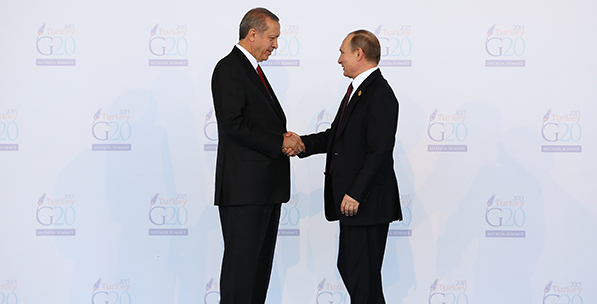A Russian warplane's violation of Turkish airspace, Turkey's subsequent response and growing tensions between Ankara and Moscow hardly came as a surprise. It was clear that Russia's growing military presence in Syria and more visible support for Syrian President Bashar Assad's regime would put strains on bilateral relations. After all, the Kremlin not only filled the geopolitical vacuum created by U.S. inaction but also targeted Turkey's Syria policy by launching attacks against the moderate rebels under the pretext of fighting DAESH.
The downing of a Sukhoi Su-24 bomber aircraft in line with Turkey's rules of military engagement and the Russian bombardment of the Turkmen community in northwestern Syria marked the first crisis between the two countries in recent memory. It won't be the last confrontation, however, unless the U.S. and Turkey's NATO allies rise to the challenge: At the end of the day, Turkey and Russia have conflicting interests in a range of issues including the Turkmen minority, the refugee crisis and the expansion of Democratic Union Party (PYD)-controlled territories - key national security issues for Ankara.
In the past, the Turkish government repeatedly identified the formation of a PYD-controlled corridor across its southern border as a red line - which is why Ankara wants the moderate rebels to replace DAESH militants in the land strip between Jarabulus and Azaz. However, the Kremlin, encouraged by Washington's lack of determination, has been implementing a completely different strategy in northern Syria. The initial step of Russia's plan was to launch airstrikes against Turkmen-held parts of northwestern Syria.
In the wake of the airspace violation, the Russians have taken their operation to the next level by deploying the S-400 air defense system in the country. Unless Washington takes necessary steps soon, the Russian offensive will continue to weaken the moderate rebels, who are currently fighting DAESH to reclaim the Azaz-Jarabulus strip. Moving forward, U.S. inaction might lead to the annihilation of moderate rebels - which would compel the Sunni Arab community to choose between DAESH and the Assad regime. Ultimately, the regime and the PYD will be the only remaining players in the post-DAESH period. As such, Russia's goal is to marginalize Turkey in the international talks over Syria's future. The most recent developments, however, will have repercussions beyond Turkey's bilateral relations with Moscow.
At this point, the Kremlin aims to become the single most influential player in the new regional order by asserting itself as the dominant force in the Syrian conflict. By paying lip service to the fight against DAESH, Russia seeks to hijack the war on terror as a stepping stone to regional hegemony.
Without further delay, the U.S. and European nations should shake off the euphoria over finding a partner to share the burden of counterterrorism and snap back to reality: Vladimir Putin isn't simply forming an alliance with Iran, Iraq, Syria and Hezbollah. He's also creating a new regional order, under which the entire Middle East will have no choice but partner with Moscow - the new sheriff in town.
Preparing to vacate the White House next year, U.S. President Barack Obama is unlikely to change the course of the Syrian conflict. Failure to secure the Azaz-Jarabulus strip, however, might mean that his successor will have to answer some tough questions: Who lost the Syrian civil war to Russia? Who rolled out the red carpet leading to the Middle East to the Kremlin?
Make no mistake: Russian President Vladimir Putin is currently assigning a new role for the West in the Middle East and sugarcoating an entire geopolitical agenda with references to fighting DAESH. The U.S. Treasury's most recent decision to blacklist a number of Russian companies for providing financial assistance to the Assad regime and facilitating the oil trade between DAESH and Damascus is a positive development. Unless the West steps up to the plate, however, Russia's idea of a solution to the Syrian crisis will lead to nothing but more refugees charging Europe's doors and more foreign fighters terrorizing people back home.
[Daily Sabah, November 30, 2015]







